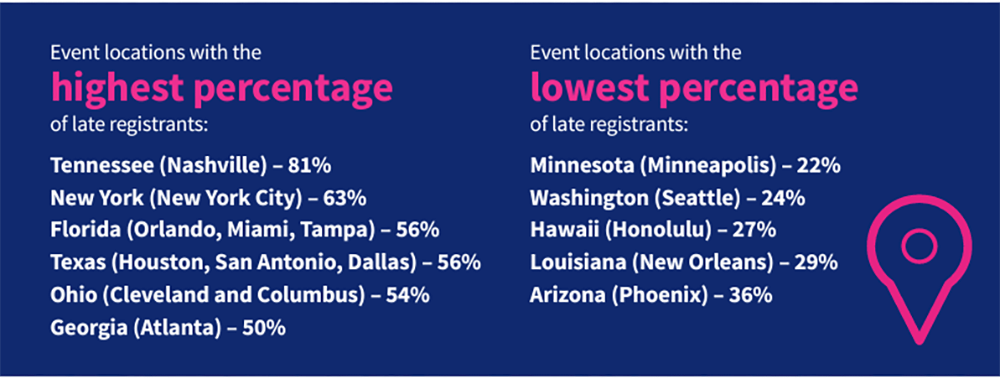 When Maritz studied when 360,000 conference-goers registered for the same 30 trade shows (i.e., 90 show instances) spanning diverse industries over three years, what emerged is how COVID remains the events industry’s biggest plot twist. While last-minute registrations spiked during the COVID years, that challenge hasn’t resolved itself. According to Maritz’s “Registration Insights Report,” in 2023, 45 percent delayed registration until less than four weeks before the event; more than one in four waited until the final two weeks before the show to register; and 9 percent registered once they arrived on site.
When Maritz studied when 360,000 conference-goers registered for the same 30 trade shows (i.e., 90 show instances) spanning diverse industries over three years, what emerged is how COVID remains the events industry’s biggest plot twist. While last-minute registrations spiked during the COVID years, that challenge hasn’t resolved itself. According to Maritz’s “Registration Insights Report,” in 2023, 45 percent delayed registration until less than four weeks before the event; more than one in four waited until the final two weeks before the show to register; and 9 percent registered once they arrived on site.
This behavior wreaks havoc for planners — the report cites logistical challenges including lack of hotel rooms/sold-out blocks; last-minute changes to F&B and session rooms; and support-staff strain, as well as such financial consequences as attrition damages and supplier surcharges. But Maritz wanted the report, sponsored by Louisville Tourism, to offer suggestions for working with this behavior rather than against it, to optimize attendance and revenues. That includes aligning marketing, pricing, and logistics strategies.
While there is no hard data in the report about why attendees are waiting longer to commit, Maritz theorizes that “we’re out of practice at attending live events now that we’ve reconfigured our lives, often toward remote working,” which makes such everyday considerations as walking the dog and caring for children more problematic when away from home.
But perhaps it goes beyond that. During the pandemic, people became comfortable attending events online and they now have a new yardstick for measuring whether it’s worth their investment and the hassle to travel to an event. If all they need is content and not the interpersonal connections, they are evaluating whether other online options exist that are more convenient for them.
Profile of Late Registrants
Maritz found that those who register late tend to be first-time attendees (who may have a more difficult time deciding whether a face-to-face event is worth it, see above), and are concentrated in certain industries. According to the report, among sectors “we might think of as being comprised of rule-followers (think: teachers, doctors, and legal or financial professionals), late registrations are less common.” For example, only 29 percent of medical and health care conference attendees register late, well below the overall average of 45 percent. On the other hand, more than half — 54 percent — of food and restaurant show participants register late.
In addition, the report points out, shows in the medical, education, financial, and legal sectors may be more likely to offer CE credits, driving earlier commitment from professionals.
Another thing late registrants have in common is they tend to be within driving distance of the event, removing the imperative to book air travel in advance.
 Latecomers Are Worth the Headache
Latecomers Are Worth the Headache
The biggest takeaway from the report is that late registrants don’t necessarily make bad attendees: Those who register in the final four weeks before the event on average spend $59 more compared to those who register more than 90 days out. The sweet spot? Those who register in the 31- to 60-day window spend $370 per attendee by registration time above and beyond registration fees — including add-on sessions, on-demand content, and social events. It sounds like once they finally make the decision to attend, they go all in. Ultra-early registrants (120-plus days out) spend nearly $100 less — and that’s not even counting the lower registration fee they pay. But a big part of this is that when early registration opens, many of these add-ons are not yet finalized and unavailable to registrants.
According to the report, for planners, the question becomes: “Are you leaving money on the table by opening registration too early — before full show offerings are available?” The most lucrative time to drive registration volume, according to Maritz, is within the 31- to 120-day window.
Here are other recommendations Maritz makes, based on their findings:
- Offer unique privileges and exclusive perks (such as networking with VIP speakers and experts) to those who register within your optimal timeframe — it can create a sense of FOMO for late registrants.
- Simplify the registration form to avoid causing registrants to abandon the process and only ask questions that will provide information you will actually use.
- Plan for latecomers — “order that extra badge stock, hire more temps, and don’t reduce your hotel room block just because they haven’t filled yet.”
- Look at your data for predictors of late registration: Such factors as whether your host city has a high drive-in population and your past history of attracting first-timers offer clues.
- Early-bird discounts are accepted industry practice, but “not only are these time-based discounts not driving the behaviors you want,” according to Maritz, “you might be giving away money to the very people who would attend your show regardless: those repeat attendees.” Some show organizers have tried alternative pricing strategies, like promo codes or discounts for certain groups like first-timers or students.
- Experiment with other pricing models, like different tiers — one price for exhibit- hall access only, with a higher price for access to the full conference; and session flexibility (e.g., entry level includes one keynote and two breakouts and mid-level would provide two keynotes and five breakouts).
- Be more transparent. Think about how you can help suppliers mitigate their sense of risk and be more open to negotiating by sharing registration data with them and CVBs “so all parties have a line of sight into what to expect.”
Michelle Russell is editor in chief of Convene.
